Jasmine Birtles
Your money-making expert. Financial journalist, TV and radio personality.

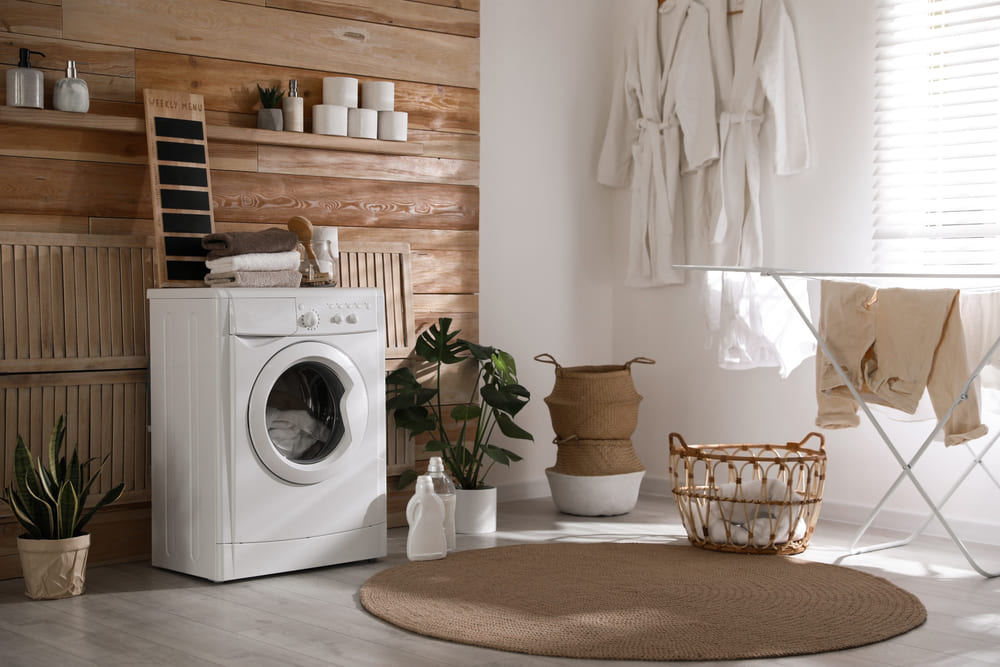
HAIER: Offering smart ways to save money on your laundry
To some, laundry can feel like a huge chore – but to others, it’s quite a joy. The smell of fresh, clean clothes, the feeling of a warm blanket fresh from the tumble dryer, and let’s be honest – is there really anything better than getting into clean, fresh sheets that smell divine? But thoughts of energy efficiency are never far from people’s minds.
Since early 2022, millions of people have been plagued with worry over their energy bills as the energy price cap soared. It became so high, in fact, that the government stepped in with the Energy Price Guarantee, aiding with the extortionate costs being faced across the UK. Now, the price cap has decreased and while this is bringing some relief, energy bills are sadly still high for many.
This is something that comes to the fore more when doing laundry. The average washing machine does four loads of laundry per week – but for many, this can be far more. Those with children will know the never-ending flow of grubby laundry very well. Paint-splattered t-shirts, school uniform that looks like it’s been through the wars and food-encrusted trousers. It’s not just kids that can get messy, either! For almost 40 years, leading smart home appliance brand Haier has devoted its energy and expertise to developing the best appliances possible. Haier’s aim is to deliver premium quality and state-of-the-art products that respond to the constantly changing needs of the modern home. Whether you’re looking for a new washing machine or tumble dryer, Haier’s products can help make your life easier and better.
Haier is providing solutions through its innovative products and the use of technology. For example, you can save over £1000 on your energy bills with a Haier Heat Pump Tumble Dryer, and over £100 on your energy bills with a Haier A-Rated Washing Machine. To explain further, heat pump technology cleverly conserves heat inside your dryer’s drum, not only lowering energy consumption by up to 50%*, but also ensuring your laundry is taken much better care of when compared to a regular tumble dryer.
According to GoodTo, an 8kg drum washing machine currently costs between 14p and 22p to run per load. In total, this works out as between £29.12 and £45.76 per year. Now, it may not seem like that much over the course of a year, but let’s not forget about the other costs associated with laundry.
Here are some ways that you can save money on your laundry.
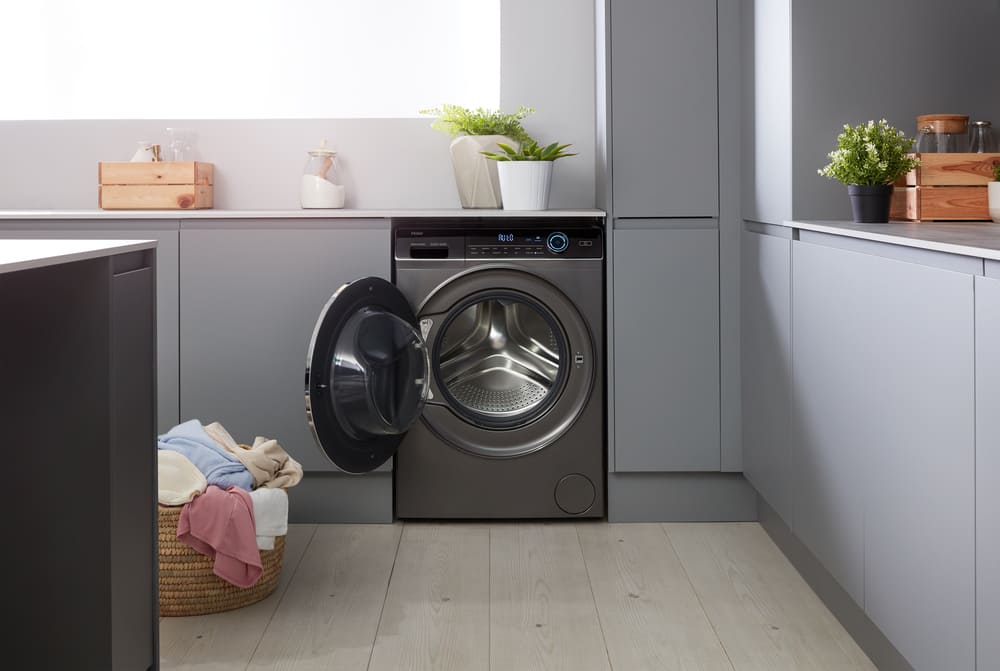
Next time you set your washing machine, think about the temperature. Consider reducing the temperature of your wash! Let’s look at this more closely.
Contrary to popular belief, colder washes don’t really impact how well your clothing is cleaned. So, putting your wash on 30 degrees as opposed to 40 to 60 degrees can cut your washing machine’s energy use in half. Save any hotter washes for items such as bedding and
sportswear – as bacteria can cling a little more to these items. Use eco mode, if possible. This will save more money.
Doing this will not only improve the energy efficiency of your washing machine, but it can increase the lifespan of your clothes, too – this will save huge money in the long run.
As with the temperature of your wash, there is a common misconception that the longer you wash your clothes, the ‘cleaner’ they will be. This isn’t really the case. Lightly soiled items can be washed on a daily quick wash. You may even be washing your clothes for too long – which can lead to wear and damage to the fabric.
You could also be doing too many washes. Are you wearing something just once before putting it in the wash? Some items could be worn a few times before being thrown in the laundry basket – particularly items such as trousers or pyjamas. Of course, some items of clothing should only be worn once before being washed – but if you only wear a jumper for a few hours before it ends up in the pile to be cleaned, then it may be something to consider.

Another way to reduce the frequency of your loads is to prioritise what you wash first. For example, instead of just chucking any old thing into the drum of the machine, wash the things you really need first – school uniforms, work clothes, items you wear regularly. Washing the clothing you really need first can reduce the number of needless cycles, saving you cash.
Taking care of your machine also brings advantages. Haier’s premium offering in laundry offers an Anti-Bacterial Treatment (ABT) that protects against mould and bacteria forming in vulnerable areas such as in the detergent drawer and porthole gasket for a more hygienic laundry cycle. A clean machine means a more efficient machine!
Are you washing just a few garments at a time? This could be costing you the big bucks in the long-term. Make sure you do full laundry loads to limit the number of washes you do. It also means you use less energy and water per item.
If you’re looking for a clever solution to load type and energy efficiency, then consider Haier. This is where Haier offers a unique technological solution. Haier’s I PRO Series 7 washing machine has a digital internal scales to weigh your laundry, before automatically adjusting the water consumption and cycle duration according to the amount of laundry you’re washing. The machine calculates the optimum settings depending upon the weight of each load, ensuring excellent results and minimum energy consumption from the Direct Motion Motor. Another smart solution from Haier that truly makes a difference.
However, don’t over-fill the drum – this can lead to clothes not washing properly and will result in re-washing. Make sure you leave enough room for your clothes to move around and wash evenly.
This goes for tumble dryers, too. Too small a load is wasted energy. However, overfilling your dryer can mean clothes don’t dry evenly or take longer to dry. This uses more energy and subsequently costs you more.
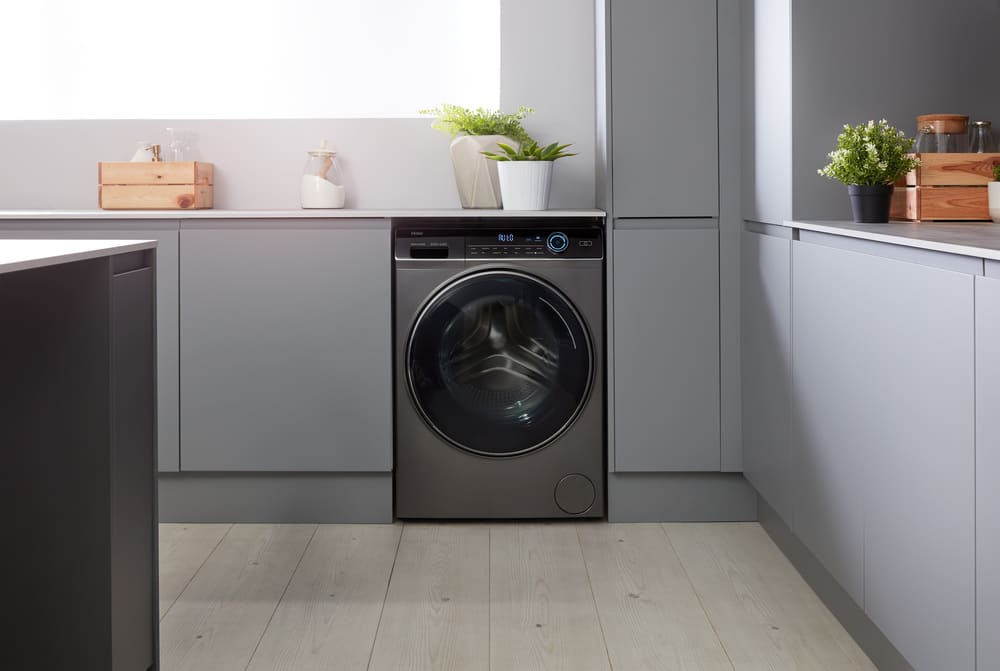
Although Eco Cycle/Programmes vary by each manufacturer, they essentially are a dedicated energy efficient cycle that uses less energy and less water, all while achieving the same washing result as an average daily cycle.
Elliott Gee, Laundry Product Manager for the UK and Ireland at Haier Europe explains that they do save money. “An eco cycle will save you money vs using a regular cycle. They use lower temperatures than most settings and as most of the energy in any cycle is used for heating the water, this results in lower energy consumption. Eco cycles also tend to use less water than regular cycles, so you save money on both water and energy!”
What about the length of the wash? Mr Gee adds, “With the gain in energy saving, you have to lose cycle time. To achieve the same cleaning results as a regular cycle but at a lower temperature and with less water, eco cycles tend to run for longer.
“The good news is that eco cycles will wash just as thoroughly as an average daily cycle however for tougher stains a more intense cycle is required. With the lower washing and rinsing temperatures and the generally gentler wash, clothes should last longer as they aren’t being washed as intensely.”
He explains that there is one con that you need to consider. “Eco cycles tend to run for longer than regular cycles and although the longer run time doesn’t result in more energy used, it can be a bit of a pain if you’re low on time or have somewhere to be!”
Some washing machines are more energy efficient than others. Newer models, in particular, tend to have built in tools that provide great benefits. Mr Gee adds that there are certain things you can look out for when buying a washing machine to ensure you are buying the most efficient machine for you to save you money in the long run.
He recommends looking at the efficiency rating. All washing machines are rated A-G, with A being the most energy efficient. Keep a look out for the top energy rating – this can keep a lid on how much money goes down the drain – literally. A great example of a highly energy-efficient washing machine is the Haier I-Pro Series 7 machine. It’s rated A for energy efficiency, comes with 14 different programmes including eco and is quiet too, which is a huge plus. It boasts lifetime energy savings of £118.
Checking the programmes the machine has is another thing to consider when choosing a washing machine. Machines with a quick-wash option are great for items that aren’t too dirty – this means you can get your clothing clean in as little as 15 minutes (depending on the model), without the cost of a long cycle. Eco options are also great. Some eco cycles are longer – but are better for your wallet. According to Energuide.be, using eco programmes can result in energy savings of 30-45%.

Again, we spoke to Elliott Gee Laundry Product Manager at Haier UK, all about the perks of investing in a quality washing machine. Here’s what he had to say.
“Investing in a good washing machine has many pros over buying a cheaper model. Better build quality results in a longer lasting machine and many are packed full of useful and efficient features. A quality machine offers better washing results thanks to washing programmes tailored for every situation.
He added some other tips around choosing a machine, “Consider what capacity is needed for your household. Larger capacity machines provide more drum space for larger loads to freely move about during a cycle. Also consider what features and programmes you’d find useful, for example Haier’s Direct Motion Motor is super quiet and efficient which not only saves you money on your bills but also allows the machine to be running and not interfere with your day-to-day household life.”
A time delay setting may also be of interest to you, if you are on an off-peak energy tariff. Off-peak energy tariffs mean energy is cheaper for seven hours over the nighttime – when energy is in less demand. A time-delay setting means you can put your laundry into your machine and delay it until the off-peak hours hit – making your laundry load cheaper. Another consideration to make is the drum size. If you live alone or with a partner, a smaller drum size, such as 8kg, may suit you best.
Alternatively, if you live with lots of people – for example, you have a large family, lots of children or live in share accommodation, a larger drum size is for you. A larger drum size will allow you to do more laundry in one go – reducing the number of washes you need to do, saving money and energy.
Considering highly energy-conscious brands is also a good route to take. Companies such as Haier make energy efficiency a priority and are constantly finding unique ways to reduce costs for consumers in their homes. They also create technology that protects your laundry from wear and tear – saving you money on clothing over time.
Cleaning your machines regularly, both the drum and the pipes, can prevent soap and residue buildup. Clearing any dregs of detergent can help your machine to run more efficiently.
As with washing machines, it is imperative you keep your tumble dryer as clean as possible. Clearing filters after each use prevents build-up, which can prevent the hot air circulating properly. The harder your dryer must work to dry your clothes – the more energy it will use.
Similarly, doing a quick spin cycle on your laundry before putting it into the tumble dryer can help remove as much moisture from your clothing as possible – meaning the tumble dryer doesn’t have to use as much energy to dry your garments.
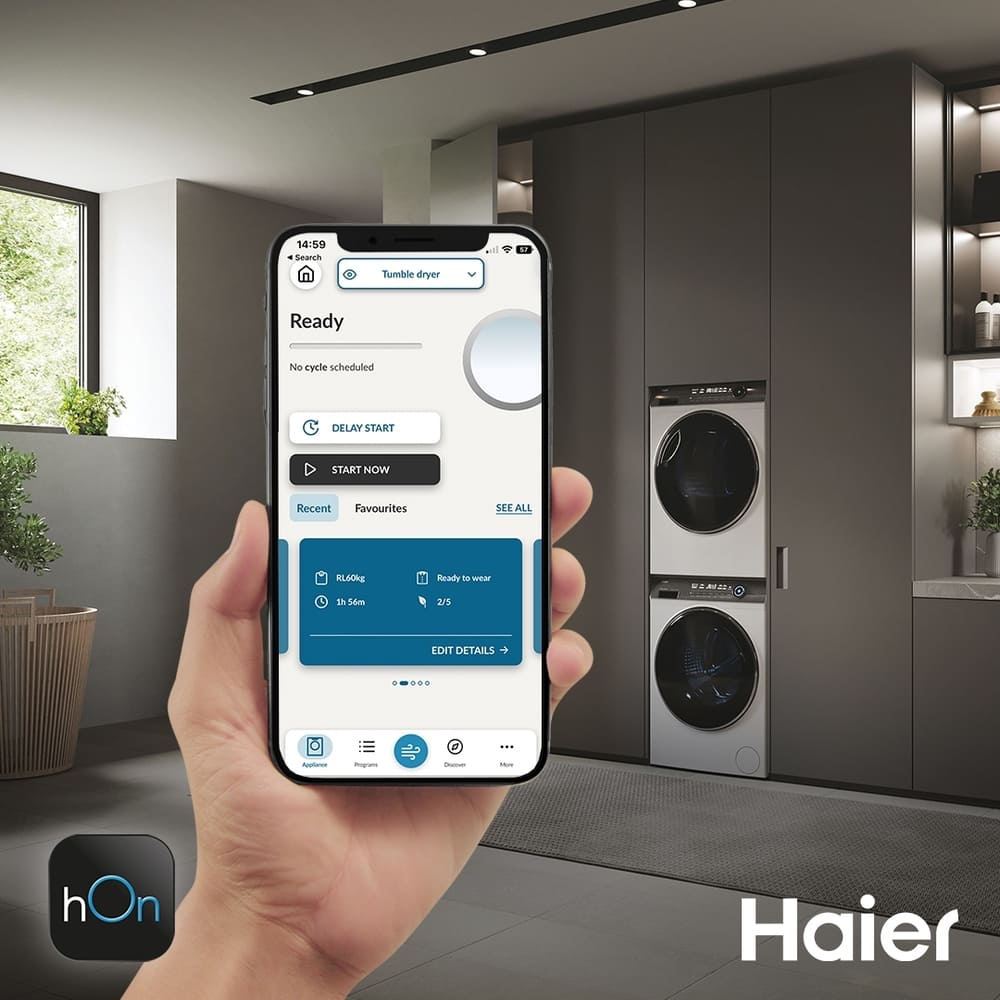
For washing alone, this is what the hOn app can do:
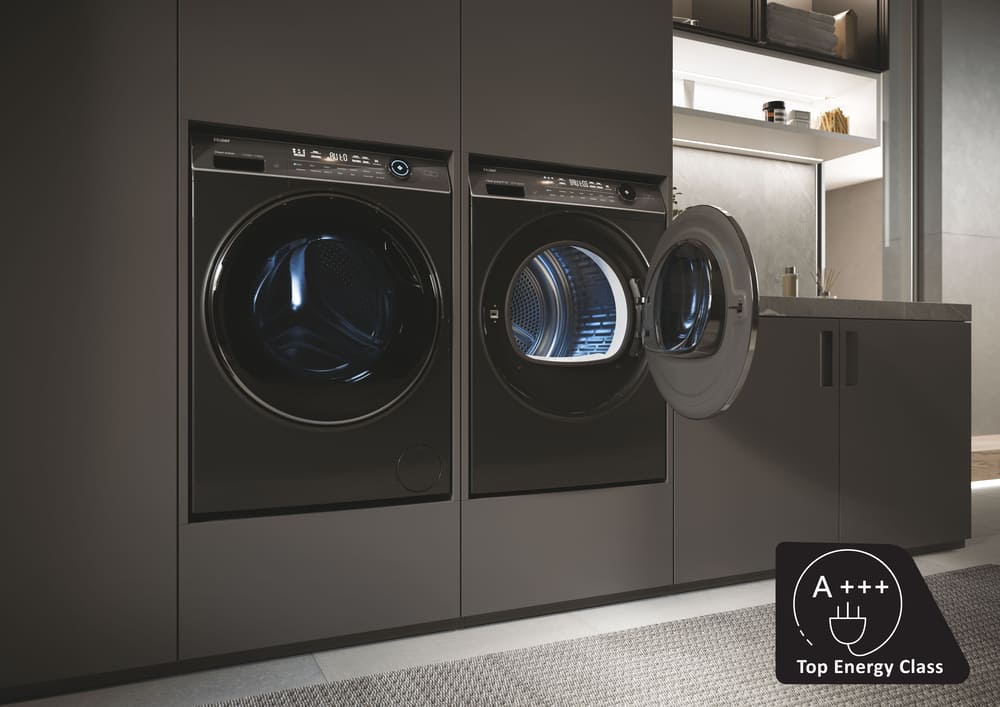
Keeping your tumble dryer somewhere where it will stay relatively warm is also key. White goods that are put in cold rooms such as utility rooms or cellars must work harder to heat up – using up more energy. Consider keeping your tumble dryer in the kitchen, if possible.
If you can, try and dry all your laundry in one session. A huge amount of energy used by tumble dryers is from the machine heating up. So, if you can put another load of washing into the tumble dryer whilst it is still warm from its previous spin, it can improve efficiency. Using tumble dryer balls can also help separate your clothing as the dryer spins, helping it dry more evenly and quickly, saving energy.
Using an energy-efficient tumble dryer is also key. The I-Pro Series 7 Plus dryer from Haier uses clever heat pump technology to conserve heat inside the dryer’s drum, lowering energy consumption by up to 50% – with savings of £320 per year*! The drum sizes also range up to 10kg – meaning you can put two washing machine loads worth of laundry in the dryer, reducing the number of cycles needed – saving you time and energy.
Rated A+++ for energy efficiency, the I-Pro Series 7 Plus tumble dryer boasts lifetime savings of £5,237, almost £1,000 more than the market average. Haier’s clever ‘My Time’ function allows you to fine tune the duration of your drying cycle. With a simple adjustment you can shorten or lengthen the time of the cycle based on your needs – such as the volume of laundry in the drum, meaning your laundry won’t be overdried, saving you money.
Another tip to save money and increase the energy efficiency of your dryer is to dry similar materials together. Different textiles dry at different rates, so drying similar fabrics together means everything will dry in equal time, and you don’t have to use unnecessary energy on clothes that are already dry. Over-drying clothes is a waste of time and energy – and will only hurt your wallet!
*Drying energy saving based on 3 years, comparing an A+++ rated Haier tumble dryer vs the corresponding KG load size on the market average B energy-rated condenser tumble dryer. Cost of energy based on 34p per kw/h, 260 uses per year. Visit haier-europe.com for details.
There are loads of ways to save money on your laundry. Where you can’t save money on the energy used within the laundry process itself, you can cut back on detergents and other washing products. But when it comes to using washing machines and tumble dryers, there are many ways to ensure the highest energy efficiency possible, saving you money over time.
See Haier UK’s full range across laundry, cooking, cooling and wine cooling here and start saving money and energy across the home: Haier UK.

This is such good advise – I am trying to save money on bills always